PROFILE • MIRIAM MAKEBA
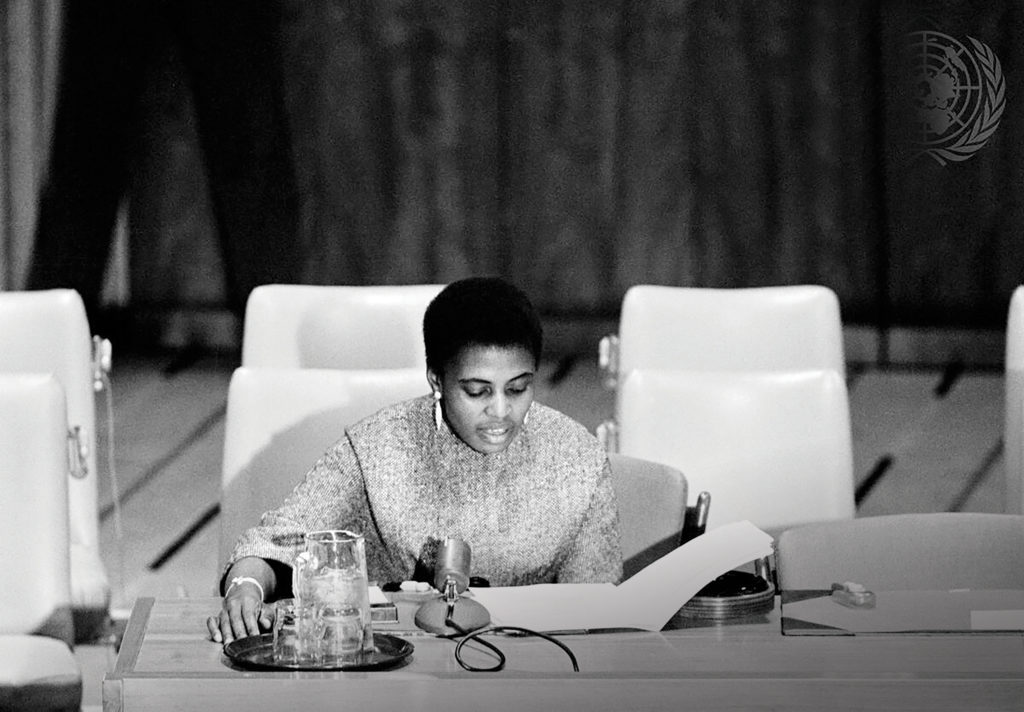
Committee in New York on the Policies of Apartheid
of the Government of South Africa in 1964.
Photo: UN/Teddy Chen.
“I Sing the Truth”
A world-renowned voice, Miriam Makeba (1932–2008) used her musical talent to raise awareness about the evil of apartheid in the international community. Because of her political activism she was banned from her own country, a price she had to pay for contributing to the liberation struggle of South Africa
BY MARIAN PALLISTER | CHAIR OF PAX CHRISTI SCOTLAND
I GREW up thinking that all South African women were strong and possessed of a political voice. The Anti-Apartheid Movement in Scotland was very active from the early 1960s and two of its major movers—Norman and Janey Buchan—were the parents of a classmate at school in Glasgow. The Buchans, and other parents like them, influenced so many of us. There were protest marches, crowded gatherings in family homes—occasionally attended by exiled South Africans who explained the devastating situation in their home country.
And there was music: the music that gave me that idea about strong, political South African women. Miriam Makeba’s voice seemed to us to embody all that we needed to know about the struggle against the marginalisation—the dehumanisation—of a nation. As teenagers we thought that the mix of jazz and African Xhosa music was cool.
But of course, Makeba was by then only able to perform outside her own country, while her compatriots inside South Africa were subject to the degrading apartheid regulations. She had left to further her singing career, only to find that her political voice barred her from going home.
Mama Africa
She would say in later years,
“I always wanted to leave home, I never knew they were going to stop me from coming back. Maybe, if I knew, I never would have left. It is kind of painful to be away from everything that you’ve ever known. Nobody will know the pain of exile until you are in exile.”
When she was allowed—welcomed—back to South Africa, it was after half a lifetime of influencing young (and not so young) women around the world to speak out for their human rights, for themselves. She left in her wake, musicians such as Beninese-American Angélique Kidjo, who acknowledges Makeba as a role model and earlier this year said “We have to speak truth to power through music.” Makeba certainly did that.
So, a role model, a hero, she was a thorn in the flesh of the apartheid regime in South Africa and indeed of some northern hemisphere governments when her alliances became too difficult. She was showered with many flattering names: Mama Africa, the Empress of African Song, the Queen of South African music, and Africa’s first superstar. She was also shunned—in time, the US wasn’t prepared to accept her civil rights stance, whether on race or gender issues, especially after her marriage to Stokely Carmichael, the Black Nationalist responsible for the slogan ‘Black Power’ and a separatist agenda.
Makeba would say, “Africans who live everywhere should fight everywhere. The struggle is no different in South Africa, the streets of Chicago, Trinidad or Canada. The Black people are the victims of capitalism, racism and oppression, period.”
Her life in South Africa certainly gave her ownership of that sentence, that Black people were (and in all honesty still are in 2021) victims of capitalism, racism and oppression. Miriam Makeba was a victim of all three when on 4 March 1932 she was born in the segregated neighbourhood of Prospect, in Johannesburg.
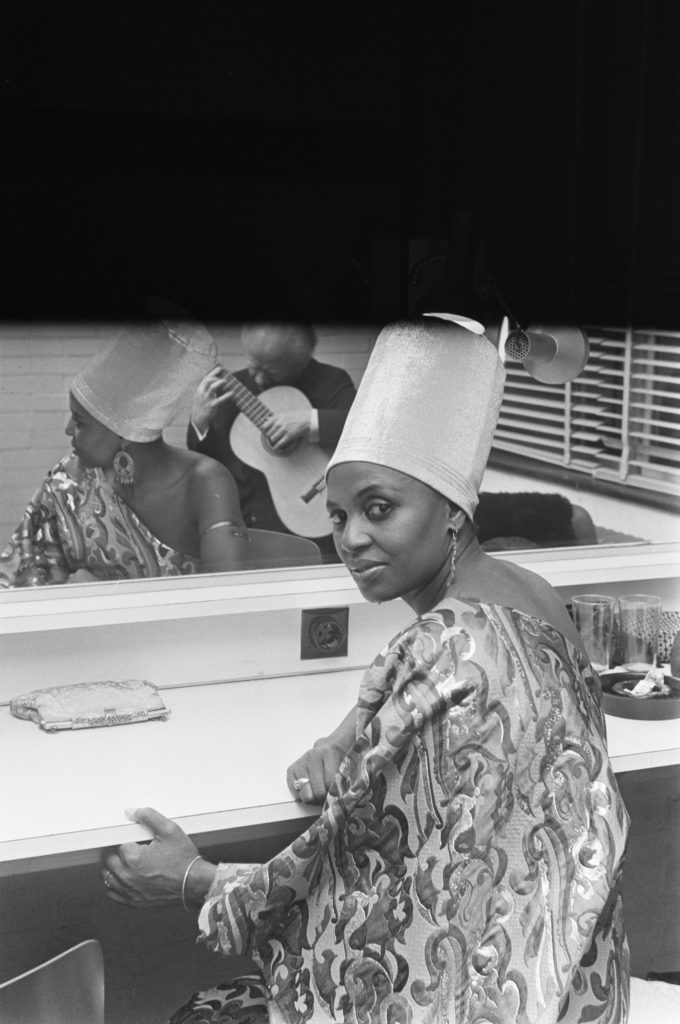
A road out of poverty
Her Xhosa father, Mpambane Caswell Makeba, and Swazi mother, Nomkomndelo Christina, called her Zenzile Miriam. The shortened ‘Zenzi’ was a Xhosa name traditionally meaning ‘you have no one to blame but yourself’, intended to provide support through life’s difficulties. Living where they did, they knew there would be difficulties for their daughter, their family. After all, when Miriam was only 18 days old, she began a six-month prison sentence with her mother, who was jailed for illegally brewing beer—a poverty-beating strategy adopted by many women.
Later, the family moved to Nelspruit, now named Mbombela, the capital of South Africa’s Mpumalanga Province, where her father worked as a clerk for the multi-national oil company Shell. When Miriam was just five years old, Caswell died. It was left to her mother to keep the family together, working as a housemaid and sangoma or traditional healer. Miriam was put into the care of her grandmother in Riverside compound, Pretoria.
It was a poverty-ruled upbringing, but in school and in church her singing attracted attention. So, although her first employment was helping her mother as a cleaner, music was the big draw. Apartheid had been introduced in 1948, but living in Sophiatown in the early 1950s, where the races did mix, she heard big band music, African jazz and traditional songs. She saw that it could be a road out of poverty. There were, however, some very serious roadblocks. Miriam married trainee policeman James Kubay, with whom she had a daughter, Bongi, at the age of seventeen and shortly afterwards was diagnosed with breast cancer. Thankfully, her mother successfully cured the cancer.
She suffered abuse in the marriage, which ended after two years. A supportive family was always important, and her cousin had a band called the Cuban Brothers. Although this music scene was male dominated, Makeba joined the band, gained a following, and in 1954 she moved to the headline band, the Manhattan Brothers. When the band travelled abroad, Makeba stayed in South Africa and formed the all-female Skylarks, recording some major hits.
This may sound like a musician’s dream, but the band’s experiences under the apartheid regime were demeaning and humiliating, so when the Manhattans invited her to go on tour outside South Africa, she went with them to what today are Zimbabwe and DR Congo. She turned solo in 1957 to tour the continent in the African Jazz and Variety Review for a year and a half, then was cast as the female lead in the musical King Kong, the story of a boxer.
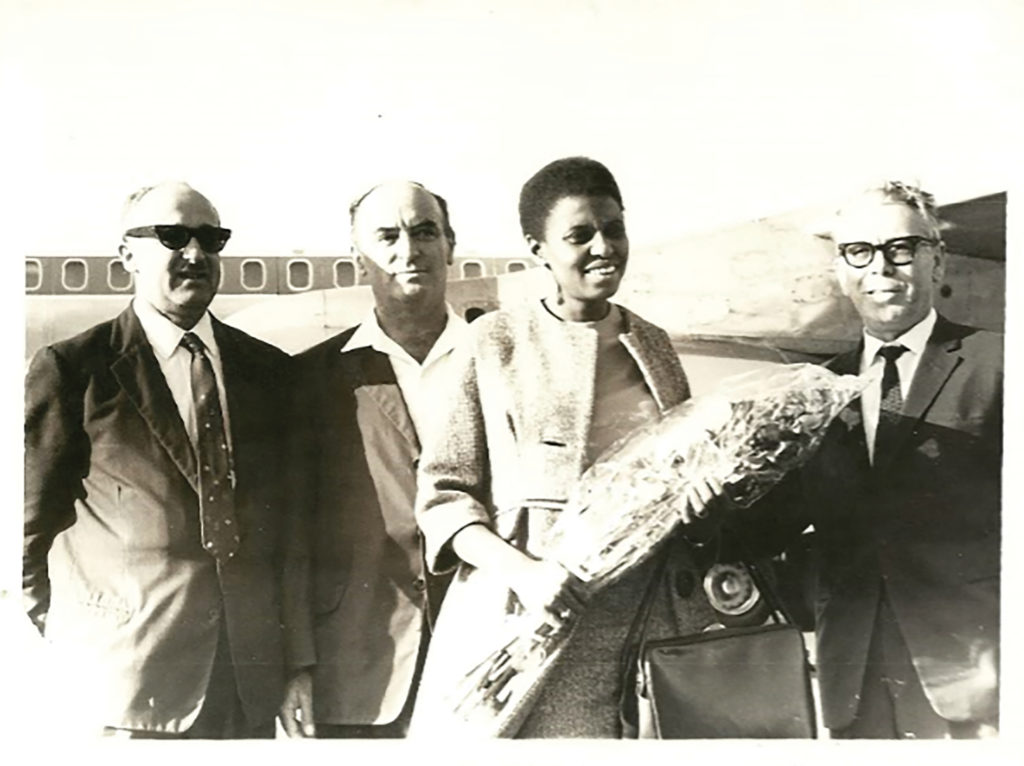
Photo: Leora Slutsky/commons.wikimedia.org.
Three decades long exile
tra, who had toured with the Manhattan Brothers, was Hugh Masekela. This was a man well-known for his long-standing anti-apartheid stance. Archbishop Trevor Huddleston, the respected anti-apartheid activist, had spotted Masekela as a promising musician when he was still at secondary school and bought him his first trumpet.
With others encouraged by Huddleston, he became a member of the Huddleston Jazz Band, South Africa’s first youth orchestra. As he grew as an artist, his music reflected his own activist views and expressed the oppression felt by the Black population. Huddleston assisted him to leave the country after the Sharpeville massacre in 1960, and he went first to London and then New York.
Meanwhile, the independent political filmmaker, Lionel Rogosin came into Makeba’s life and dramatically changed it for decades to come. In his film Come Back, Africa (filmed in secret to avoid South African government censorship), Makeba played herself. In 1959, Rogosin invited her to its premiere at the Venice Film Festival, where her four-minute appearance in the movie made her an overnight sensation. She was flown to London and later to New York for TV interviews and appearances, and was booked to sing at the Village Vanguard jazz club. While she was in London, Makeba married Sonny Pillay, a South African ballad singer of Indian descent. It wasn’t a success and they divorced just months later.
In recognising Makeba’s magic, Rogosin had merely set up the fireworks. Harry Belafonte, American singer, songwriter, actor and supporter of the civil rights movement, lit the blue touch paper by introducing Makeba to United States audiences. Belafonte also mentored Hugh Masekela, who like Makeba was living among South African exiles and Black activists in New York. In 1963, Masekela—by now also an activist of note—would become her third husband.
Makeba recorded songs such as Pata Pata and the Click Song, which became earworms for the politically aware worldwide. In1965, Belafonte and Makeba would win a Grammy Award for a memorable collaboration, the album An Evening with Belafonte/Makeba, which focused on the political situation for Black South Africans under apartheid.
The Sharpeville massacre in 1960 that had sent Masekela out of the country had, of course, been seen in grainy black and white newspaper photographs around the world, galvanising all who were already campaigning against apartheid and recruiting many more. It had been a defining moment for Makeba. Her mother died shortly after the massacre and the South African authorities denied her permission to attend the funeral. Her South African passport had been revoked.
Little did she know that her exile would last three decades. No one knew the depths of the struggle that would be waged during that time in her homeland.
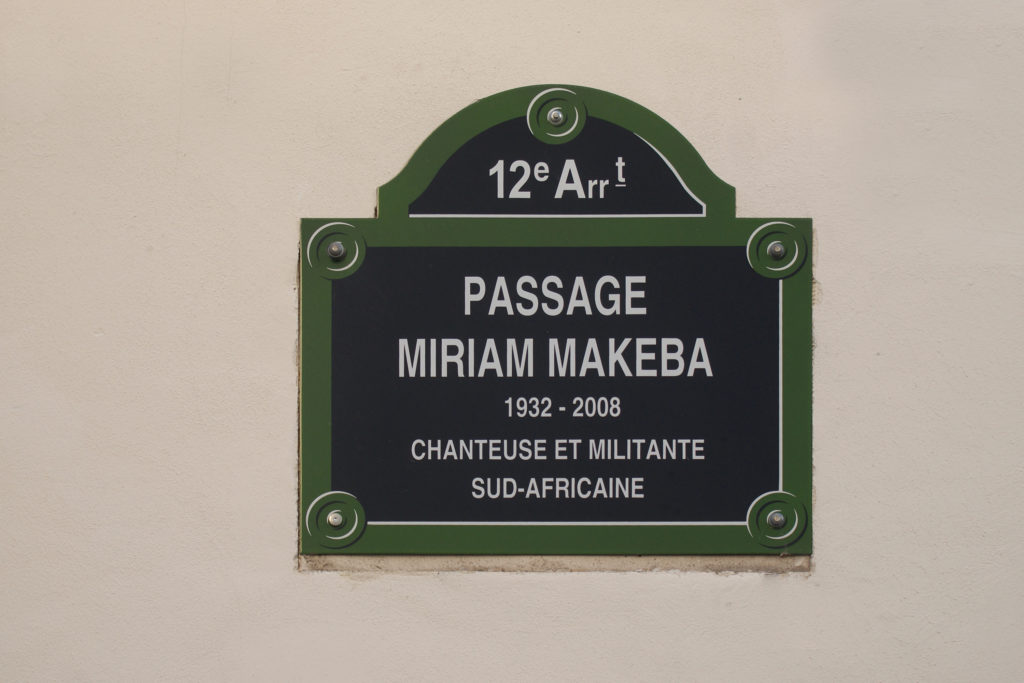
Photo: Artvill/commons.wikimedia.org.
Banned at home
Makeba had to put her emotions on hold and proceed with a showbiz career that enveloped her in an A List circus, meeting and working with the biggest names of the era as a singer and actress—even singing at the John F Kennedy birthday party at which Marilyn Monroe serenaded the US president.
This insane celebrity could have turned her head. Instead, she drew on her South African experience and in 1963 gave the first of a number of speeches before the United Nations special committee on apartheid. South Africa’s response was to ban her records. Other African governments were more sympathetic: she was the only performer to be invited by Ethiopian leader Haile Selassie to perform in Addis Ababa at the inauguration of the Organisation of African Unity.
Divorced from Masekela in 1968, Makeba moved even more deeply into the world of civil rights activism, marrying that same year the militant African-American civil rights activist and Black Panther leader, Stokely Carmichael. The US government had Carmichael in its sights and the couple went into exile in Guinea, the West African Marxist state whose leader, Sekou Touré, gave sanctuary to enemies of the capitalist West. Residence in Guinea meant she was not welcome in a number of countries, but Makeba did tour parts of Europe, South America and Africa in the 1970s and 1980s. They were not always big venues, but they served to keep the anti-apartheid campaign alive. She also appeared at major jazz festivals, including Montreux.
She twice addressed the United Nations’ General Assembly, speaking out against apartheid as a Guinean delegate to the UN. In 1986, the Diplomatic Academy for Peace awarded her the Dag Hammerskjold Peace Prize.
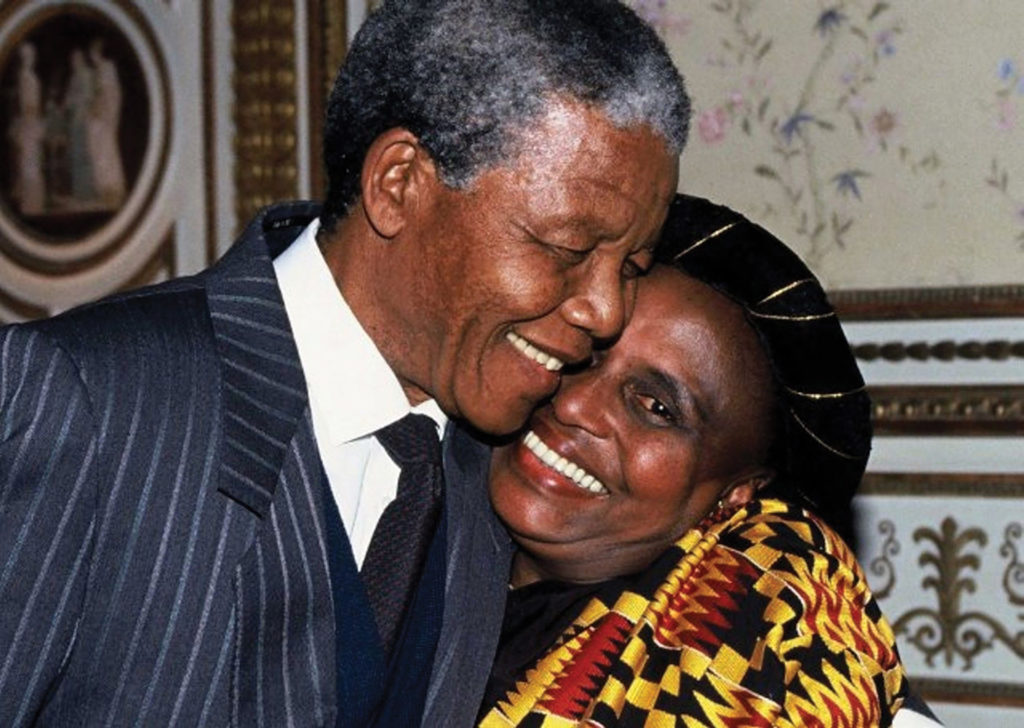
Anti-apartheid most audible spokesperson
This was the public Makeba. In private, she faced personal conflict and tragedy. Having separated from Carmichael in 1978, there was a fifth marriage to airline executive Bageot Bah. Her youngest grandson became fatally ill, then her daughter, Angela Sibongile Makeba—Bonji—died in 1985 following a miscarriage. As beautiful and talented as her mother, Bonji had a career ahead of her as a singer, composer and activist. She had only made one album, but her mother continued to sing her songs, including one written for Makeba after she had been the delegate for Guinea at the Mozambique independence celebrations.
Makeba herself was diagnosed with cervical cancer at this time, so perhaps it is little wonder that she battled with alcohol abuse for a time. She always said, however, that she derived consolation from her music and her undying faith in God.
By 1987, and now living in Belgium, Makeba was able to join American singer Paul Simon in newly independent Zimbabwe, where his Graceland concert highlighted South Africa’s racist policies. It rekindled interest in Makeba’s music and she was invited to perform for heads of state, including French president Francois Mitterand, Cuba’s Fidel Castro and Pope John Paul II.
After Nelson Mandela was freed in 1990 he encouraged Miriam Makeba to return to South Africa—and so, after 31 years in exile, she went home—and would became a United Nations goodwill ambassador for South Africa.
When Makeba died in November 2008, The UK’s Guardian newspaper called her ‘the anti-apartheid movement’s most audible spokesperson’. Today’s female artists are confident to use their platform to speak out against racism and gender abuse. They follow in the footsteps of that ‘audible spokesperson’, who told the world: “People say I sing politics, but what I sing is not politics, it is the truth. I’m going to go on singing, telling the truth.”
